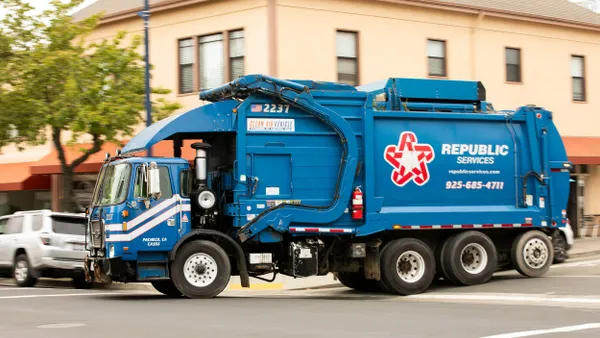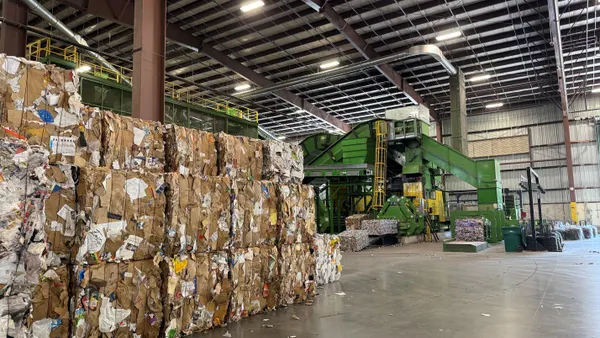Waste Pro's board just elected a 27-year-old to be president — a move that would be surprising at just about any other large company besides this Florida-based operation.
Though the move makes sense to many as Sean Jennings is a third-generation "garbage man" by way of his father — founder, chairman and CEO John Jennings. He started working with the company in 2014 (most recently holding the title of division manager in the Bradenton-Sarasota area) and has previously worked in operations, landfill construction and collections.
Jennings assumes this role at a company founded in 2001 on a model of what it describes as more "values-driven service" than the nationals can offer. Waste Pro continues to grow at a rapid clip in the Southeast and just recently opened the first of two new planned driver training centers. Waste Dive recently spoke to Jennings about his plans for the role and his outlook on what many consider the million-dollar question of how to attract younger talent.
The following interview has been edited for brevity and annotated for context.
WASTE DIVE: You're in the somewhat unique position of having worked on the front lines. Some executives have, but a lot haven't. Do you ever miss being out in the field now that you're in the office?
SEAN JENNINGS: Oh yeah, sure ... It can be pretty liberating to be able to just go out and throw trash and not think of anything else. I really didn't realize that, especially until I was working on a truck in Costa Rica. That was the only time, because I wasn't working for Waste Pro, that I didn't have to be constantly concerned about every little detail.
The story goes that Jennings received a plane ticket to Costa Rica as his college graduation present, but that meant spending six months on the back of a truck and six months at a landfill there.
Will you still be getting out to tour facilities and check in on the front lines in this new role?
JENNINGS: Yeah, after [moving to the corporate office] I'll be on the road.
I have a good understanding of a lot of the things that actually go on [from] being fully immersed in all the front line and firsthand experiences, from throwing trash to operating a site, and I think that that'll help me have a better understanding of what goes on inside the heads of each of the people in those positions. I can't imagine trying to learn and then manage somebody where you haven't experienced it first hand.
When thinking about hiring and attracting new people to the industry, does that experience help? Do you feel you know more what people are thinking because you've done the work?
JENNINGS: Yeah it definitely helps. I'm not sure if it's valuable from the standpoint of being in the head of the person in each of those positions, or just understanding people in general.
Some of the big things that I learned from working in different sites, and even in a different country — which was really surprising to me — was that I was able to overcome both socioeconomic upbringing and a language barrier just through respect. People, I think, can read that through other things. That's the awesome thing about our industry that can be so challenging and at the same time so rewarding — being so heavily reliant on people.
People always talk about the waste industry as a low-tech industry, but really, being so heavily reliant on people, I think that we're actually the most cutting edge.
In the sense that the human element is so important, the idea of customer relationships, the pride people take in their work?
JENNINGS: Yeah, and I think that when it comes to understanding people, you can't compare understanding a piece of equipment or anything like that to a person.
People always ask me, being a younger person, what do the younger generations want? For a while it was difficult for me to answer ... To me it just kind of seems like a more refined understanding over time of what people want in life.
So, I think that's the direction that we are moving toward, to understand our people better — understand what people ultimately want from their work, from their life. Luckily I think that the fundamentals of what Waste Pro is when we're being true to our culture is to respect people and acknowledge that there is nothing more important than people.
Waste Pro often touts its unique approach to recruitment and retention through moves such as a unique partnership with the Florida Department of Corrections for second-chance hiring.
Some people seem to think technology can make the job more appealing. Automated trucks, new computers in the cabs. It sounds like you don't quite see it that way?
JENNINGS: When we're trying to recruit the next level of management, I think a misconception is that we can't attract that level of manager who might be drawn to a more seemingly technologically advanced industry, but in reality we're dealing with people. I think that this can be more challenging and more rewarding than people really do think.
After the company's safety bonus program was mentioned, Jennings recalls a prime example of it being awarded earlier that day.
JENNINGS: This morning in Sarasota we had a huge breakfast for about 200 people, and it was for one of our front-load drivers that got the three year, $10,000 bonus. It was a surprise for him, which was interesting because that shows that he wasn't even watching his date and trying to get closer ... Everyone was cheering for him, it was awesome.
It's a huge morale booster, because it's just another way that we can show with our actions what we think is important. It's a huge communication tool.
Do you have any goals you've set for yourself, or the company has set for you, in terms of this new job? How should people be thinking about you in this role and what that means for Waste Pro?
JENNINGS: My plan is to get out and truly understand Waste Pro as a whole, who we are, and the one way that I can be more effective than most other people is my understanding of what our culture is. Of course growing up with my father, and being around him, getting to work with him, I have a good understanding of what our culture is.
How should we think of Waste Pro culture? What makes it unique from anybody else?
JENNINGS: I would say a deeper appreciation of people.











